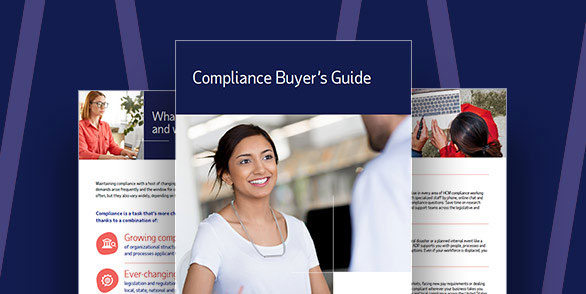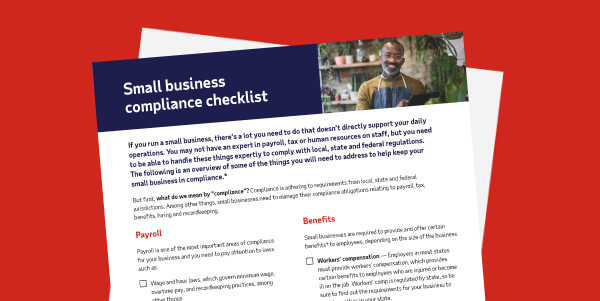Dismissing an employee is not always a definitive end to the employer’s duties concerning that individual. In some cases, employees are entitled to unemployment insurance, which means employers must manage unemployment claims. This process can be challenging, as well as tedious. Without expert support and a clear understanding of how unemployment works, employers risk monetary penalties and higher insurance costs.
Table of Contents
What is unemployment insurance and how does unemployment work?
Unemployment insurance provides temporary wage replacement to eligible employees who lose their jobs through no fault of their own, e.g., they were laid off rather than terminated for misconduct or voluntarily resigned for reasons not attributable to the employer. The two pieces of legislation that grant this benefit are the Federal Unemployment Tax Act (FUTA) and the State Unemployment Tax Act (SUTA).
SUTA is mainly responsible for administering payments when laid-off employees file for unemployment. If funds become insufficient, the states may borrow from the federal trust fund created by FUTA. States that don’t repay their loans to the federal government within a certain time are known as credit reduction states.
Who pays for unemployment benefits?
With a few exceptions, only employers contribute to federal and state unemployment programs. The outliers are Alaska, New Jersey and Pennsylvania. In these states, both employers and employees pay SUTA tax.
The FUTA tax rate is 6% of the first $7,000 each employee makes annually, also known as the FUTA wage base. Employers may be eligible for a 5.4% credit reduction, which lowers their rate to 0.6%. To qualify, they must pay their SUTA taxes in full and on time and not operate in a credit reduction state.
SUTA tax rates and wage bases vary by state. Employers should check with their state unemployment agency or a licensed tax attorney for the latest information.
What responsibilities do employers have when managing unemployment?
In addition to paying their FUTA and SUTA taxes, usually done online, employers must contend with unemployment claims management. This process involves responding to notices, preparing for appeals and hearings, and auditing benefits charges.
Responding to unemployment claims
When former employees apply for unemployment benefits, the state agency will send a notice to the employer requesting certain information, such as:
- Hourly wages or salary
- Dates of employment
- Status (full time, part time, seasonal)
- Reason for separation
- Date and details of the final incident
- Documented evidence of misconduct
- Additional compensation or severance pay received
Employers must respond to these notices by the appointed deadline or risk penalties and increased SUTA tax rates.
Appealing unemployment claims
To be eligible for benefits, workers generally must be unemployed for reasons outside of their control, such as layoffs, furloughs or seasonal work coming to an end. In some cases, even quitting for good cause or being fired for anything other than misconduct can be a valid separation. Employees must also meet state requirements for wages earned, time worked and other criteria, such as being able and available and actively seeking work.
If employers think a former employee does not meet any of these qualifications, they may contest the unemployment claim. Supporting documentation, such as performance reviews showing a history of misconduct, usually needs to be provided. If the unemployment agency approves the employee’s claim, employers may appeal it and request a hearing. They must explain why they disagree with the agency’s decision and provide any new evidence discovered before the hearing. First-hand witnesses may also be required to testify.
Unemployment benefit audits
Although not a requirement, auditing benefits charges can help save money. In fact, the U.S. Department of Labor Benefit Accuracy Measurement (BAM) program shows that state unemployment agencies often charge employers when they should not be charged.
Audits can also be used to compare information supplied by the employer with information provided by the employee to determine if an overpayment occurred. Any benefits paid in error may result in a credit to the employer’s unemployment tax account.
What does an unemployment claim cost an employer?
The state unemployment insurance (SUI) tax rate for employers generally depends on the number of people they employ, how much they’ve paid into the program and how many former employees have filed claims. Therefore, a single filing in and of itself does not incur additional costs for employers when benefits are dispensed, but it could increase their tax rate in the long term.
How can employers lower the cost of unemployment insurance?
Given that the number of employees receiving unemployment benefits directly impacts SUI tax rates, one of the best ways to lower unemployment expenses is to avoid laying off employees as much as possible. Layoffs, however, are sometimes a fact of business. As such, it may be cost-effective to perform benefits charges and wage audits, which can help identify instances of unemployment fraud, erroneous payments and overpayments.
It’s also important not to overlook the basics, like paying unemployment taxes and responding to agency notices on time, since non-compliance can result in penalties and increased tax rates.
Frequently asked questions about how unemployment works
Can an employer deny an unemployment claim?
Employers may appeal an unemployment claim if they think their former employee does not meet the eligibility criteria. But the ultimate decision to deny a claim lies with the state unemployment agency after they’ve heard arguments from both the employer and the employee.
Does it cost an employer if an employee collects unemployment?
Unemployment benefits are disbursed from taxes already paid, so when an employee files a claim, the employer does not immediately incur any additional expenses. However, an employer’s SUTA tax rate may go up over time if an increasing number of former employees receive unemployment benefits.
Do fired employees get unemployment?
Terminated employees may be eligible for unemployment as long as the reason for their dismissal was not due to misconduct. Examples include, but are not limited to:
- Company theft
- Criminal activity
- Sexual harassment or abuse
- Excessive unexcused absences
This article is intended to be used as a starting point in analyzing how unemployment works and is not a comprehensive resource of requirements. It offers practical information concerning the subject matter and is provided with the understanding that ADP is not rendering legal or tax advice or other professional services.






